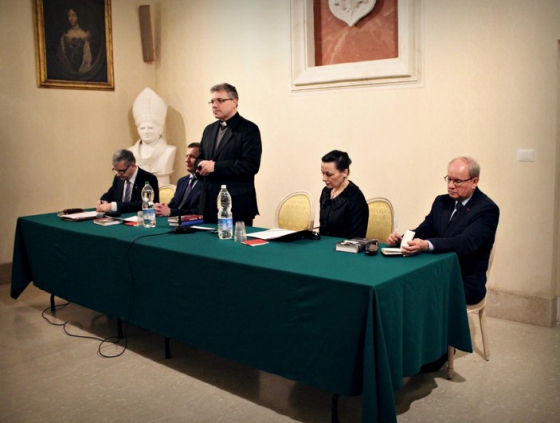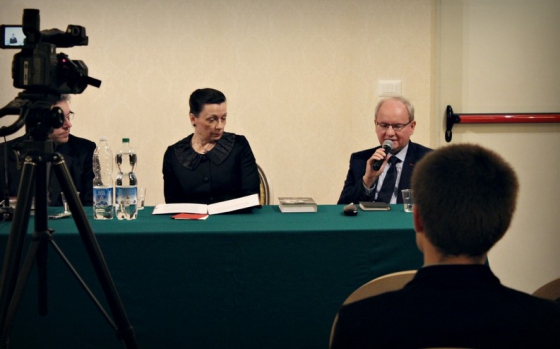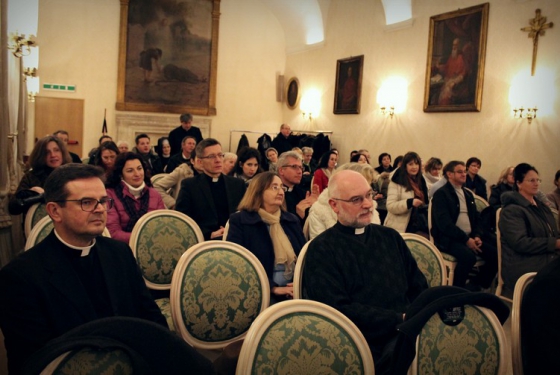On Sunday, January 24, in the auditorium of John Paul II at the St. Stanislaus Church in Rome a presentation of the publication “Ağca Was Not Alone. Around the Participation of the Communist Special Services in the Assassination Attempt on John Paul II” took place. The book, that is a summary of many years of investigation carried out by the Institute of National Remembrance (Instytut Pamięci Narodowej) in Katowice, was published at the end of 2015 by the Institute of National Remembrance in Katowice and Instytut Gość Media (“Gość Niedzielny”). After promotion in several cities in Poland, the time came for its presentation in the Eternal City, where, 35 years before, there was an attempt on the life of the Holy Father.
At the beginning of the meeting, Dr. Andrzej Sznajder, the director of the branch of the Institute of National Remembrance in Katowice, stressed that the investigation used new documents that allowed unquestionably indicate communist secret services, especially the Bulgarian ones, that exercised Soviets’ commands, as the co-organizers of the assassination attempt of 13 May 1981. During the lawsuit the records of the earlier trials that took place in Italy were collected and analyzed. Documents of the Bulgarian secret services and German Stasi were also obtained. In total, prosecutors and investigators from the IPN collected more than 220 volumes of files. They also benefited from international legal assistance and interviewed more than 100 people. The investigation has not led to charges against specific persons and to the trial. But undoubtedly it provides a strong argument for saying that the communist services were “driving force” to prepare the attempt, and then impeded the conduct of the trials and sentencing of the guilty.
The prosecutor Ewa Koj, the head of the Commission for the Prosecution of Crimes Against the Polish Nation at the IPN in Katowice, told about the start of the investigation. In the spring of 2005 Italian press reported on the disclosure of Stasi documents relating to the attempt on John Paul II, and it was the reason to take the case again. After determining the formal aspects, including that John Paul II remained until his death a Polish citizen and that there was a reasonable suspicion that the attempt had been a crime of the communist system, the IPN prosecutors from Katowice began the investigation in 2006. It must be mentioned that this work started by the support and involvement of Prof. Janusz Kurtyka, who at the time led the activities of the IPN.
The Prosecutor Michał Skwara led the investigation for more than eight years. A decision of its discontinuance is the major part of the presented book, i.e. over 270 pages. In his speech Michał Skwara drew attention to the new findings, which – as he believes – not only shed new light on the matter of the assassination attempt, provoke discussion and further investigation, but also allow to formulate a thesis that the Bulgarian intelligence service, using the Turkish criminal environment, took a direct part in the preparation of the attempt. It was an operation perfectly carried out. Ağca was directed by the Bulgarian services since the end of 1979. And then, during the period of investigation and court trials, he was effectively intimidated by them.
In this case one should talk about two types of crimes: an armed conspiracy, aimed at killing the pope, and a conspiracy of disinformation, which began after the failing of the attempt, and was directed to committing different kinds of fraud that could dismiss the suspicion that had fallen on the secret services of the communist countries. Currently, there is no doubt in the participation of three Bulgarians – acquitted for lack of evidence by the Italian court – in a preparation of the attempt, as well as there is no doubt in their well-documented activity as the agents. The Bulgarian secret services cooperated with the Soviet services and with German Stasi, which came into possession of the documents from lawsuits in Italy.
It is therefore legitimate to say that during the Italian trials many mistakes were made and Italian judges worked under political pressure what openly admitted one of them during a conversation with the prosecutor Skwara. It should be noted also an ambiguous attitude of countries such as Great Britain, France and Germany which refused to interview key witnesses who could clarify the matter.
On the other hand, Andrzej Grajewski, historian and editor of “Gość Niedzielny”, the author of the historical article presented in the book, stressed that the findings of the prosecutor Skwara did not contain such a hard evidence as it would be, e.g. an order to kill the pope, signed by the authorities of the Soviet Union, but they contained a large amount of evidence supported what the Italian prosecutors had not proved. During the investigation it was succeeded to find a number of significant “links” that connect people and events, the activities of intelligence services and the criminal world. Persons involved in the attempt knew as much as they should, finding themselves under constant scrutiny by others. It was a meticulously prepared operation of the special services.
The historian agreed with the prosecutor that the attempt had been prepared for about a year. He noted that the immediate motive to start preparations could be the first pilgrimage of John Paul II to Poland and above all its social consequences and impact on the kindred nations, including revival of the Greek Catholic Church. Soviet atheism was the basis of the communist system, and John Paul II, as an apostle of religious freedom, rocked its foundations.
The Bulgarian trace in the assassination attempt means a question about the role of the Soviets. Bulgarians did not have an interest in the preparation of the attempt, but the Soviets had. They meant to make a fatal blow to the highest religious authority of the Catholics, and in this way weaken or even paralyze their aspirations for freedom. The blood shed by Pope John Paul II is the price of our freedom. And therefore we must remember the date of 13 May 1981.
Dr. Grajewski also stressed that the present publication together with a book published a few years ago (“The Pope must die”) – both published by the Institute of National Remembrance in Katowice and “Gość Niedzielny” – were a Polish voice in the discussion about the attempt. It is a constructive voice because other publications – in his opinion – basically fit into the stream of disinformation.
During the meeting the audience was informed about the preparation of the Italian translation of the book. It is hoped that the publication in this language will become a hotbed of discussion and maybe even a pretext for polemics, which will serve for further explanation of the circumstances of the attack on the Holy Father.
The presentation of the book “Ağca was not alone” sparked a lot of interest among Poles living in Rome who numerously came to the meeting. Its organizers were the Institute of National Remembrance in Katowice and the Centre for Documentation and Study of the Pontificate in Rome (John Paul II Foundation).
Rev. Andrzej Dobrzyński
